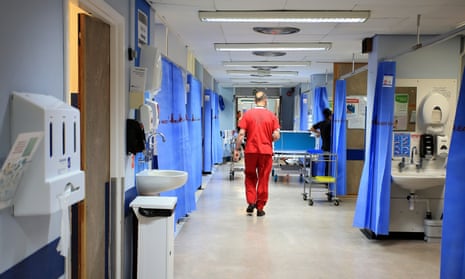NHS trusts in England ended last year with an overspend almost £3bn more than previously reported after temporary funding boosts and one-off savings were stripped out, according to new analysis.
The Nuffield Trust found the actual overspend in 2016-17 was £3.7bn, compared with the £791m reported by NHS regulators, which was already above the £580m maximum sought by health service bosses.
In a report published on Thursday the thinktank also says the NHS faces a “next to impossible” task in hitting the target of ending the current financial year with a deficit of just under £500m.
Sally Gainsbury, a senior policy analyst at the Nuffield Trust and author of the report, said: “The official figures on NHS deficits don’t reflect how severe things are for hospitals in England, as the deficits reported include one-off funding boosts or savings that cannot be repeated the following year. Only by looking at the deficit after these have been stripped out can we see the scale of financial challenge facing the NHS – and it is eye-watering.”
The report says trusts have succeeded in making billions of pounds of efficiency savings but these have largely been absorbed by inflation and reductions in the tariff paid to them per patient.
Among the items it says helped flatter the financial position of the 238 NHS acute, mental health, ambulance and community services trusts last year were a £1.8bn injection of cash from the emergency sustainability fund and about £300m the report puts down to “accountancy changes”.
The thinktank says that although the underlying deficit was reduced to £3.7bn by the end of 2016-17, trusts started the current financial year with a spending gap of £5.9bn because inflation is set to be 2.9%, hitting the NHS with additional costs to the tune of £2.2bn, while the national tariff is increasing by just 0.3%.
Even with a further £1.8bn in extra sustainability funding, the Nuffield Trust says providers will have to make cost savings of £3.6bn or 4.3% of operating costs in 2017-18, whereas the highest level of cost efficiencies managed in the past decade was 3.9%, in 2011.
Even if trusts continue to make savings at a relatively high rate, the underlying deficit will remain at more than £2bn in 2021 and could be as high as £3.7bn if inflation continues to rise faster than NHS regulators anticipated, the report concludes.
Nevertheless, the government has the ways and means to prevent this happening, Gainsbury argued. “Increasing funding to wipe out these deficits and fund much-needed reform in the NHS is entirely possible and wouldn’t even increase the proportion of our country’s wealth spent on healthcare,” she said. “Our hospitals are undoubtedly in financial crisis. But the solution to that crisis is not beyond the reach of the public purse.”
Chris Hopson, the chief executive of NHS Providers, said trusts were being asked to “balance their books, absorb further increases in demand and costs, meet stretching savings targets, all at the same time as they need to improve A&E performance and deliver new commitments for cancer and mental health provision. This is while funding for the NHS has this year fallen from 3.6% to 1.3%.”
NHS Improvement, the service’s financial regulator, declined to respond directly to the report but released its latest forecast of a sector-wide deficit of £523m by the end of the year.
Its chief executive, Jim Mackey, said: “NHS organisations are delivering financial improvement while managing increased levels of demand for services across the board.”
A Department of Health spokesperson said: “We do not recognise these claims by the Nuffield Trust - the financial position for 2016/17 is as set out in our annual accounts which have been independently audited by the NAO and published.
“We are investing record amounts in the NHS and as new expert analysis shows, spending on the NHS is in line with other European countries. Thanks to the hard work of staff our health service achieved financial balance again last year and was again judged to be the best and most efficient health system in the world.”
